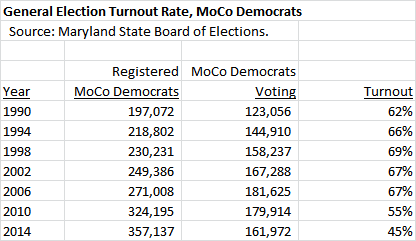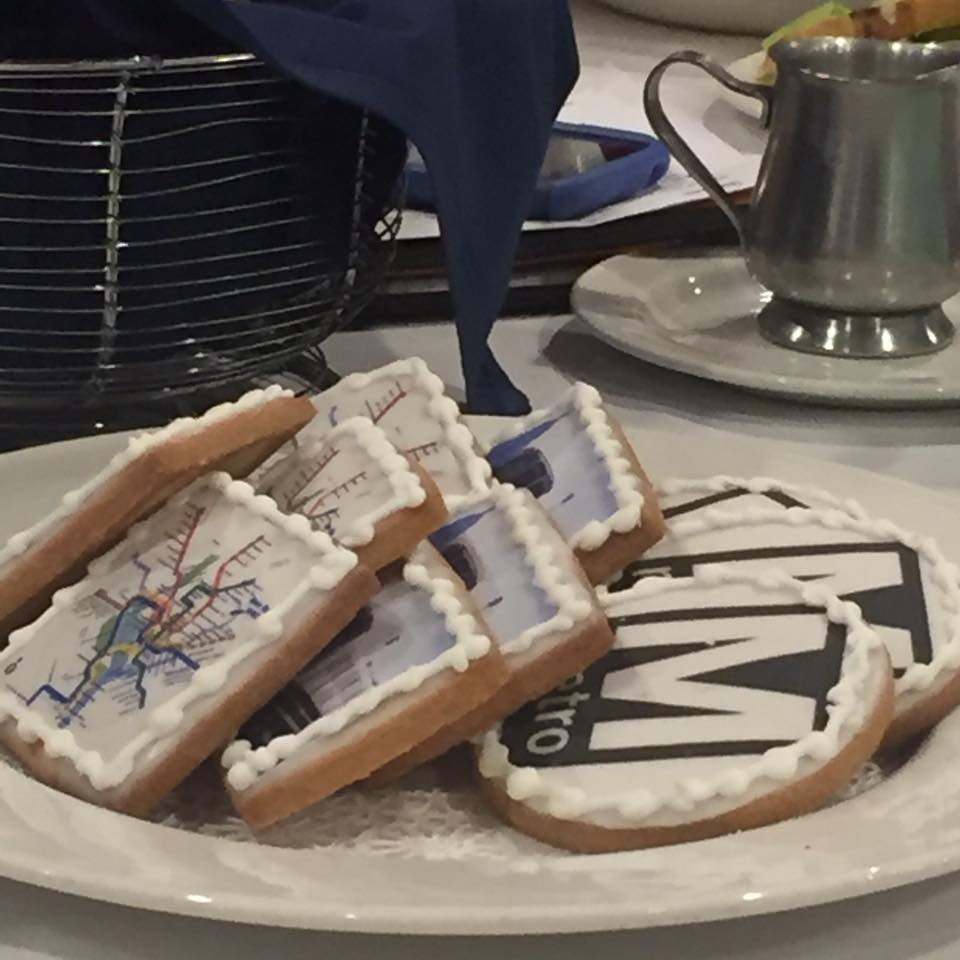The following is by Tom Moore, a former Rockville City Councilmember and and candidate for the Democratic nomination for the Montgomery County Council’s 3rd District seat in 2014. I disagree completely with Tom’s suggestions for the future focus of MCDCC but thought it would be interesting to present an alternative viewpoint.
Two years ago, David Lublin asked, “How can we measure the success of MCDCC in the future?” and listed four areas of metrics being discussed by MCDCC leaders that might do the trick: Fundraising, precinct organization, field organization, and policymaking.
Now, these were certainly important things to track, but they mostly seem to be chasing the main political party metric, the only one that really matters: So, how many of your candidates won this year?
Because the MCDCC scores an envious 100% just about every year on that metric, subsidiary metrics like fundraising and precinct and field organizations miss the point.
They don’t get nearly to the heart of the question facing the Montgomery County Democratic Party: What is the role of a party organization when it effectively doesn’t have a party opposing it?
If Montgomery County were home to a robust county GOP, the role of the MCDCC would be obvious: Build and maintain the organization that will vanquish as many Republicans as possible every November. Funds would be raised for a reason. Precinct and field organizations would have a clear mission to pursue.
Now, the day may arrive when the GOP decides to start nominating electable candidates, and when it does, the MCDCC can revert to being a regular political party with a traditional mission. But the MCDCC has to figure out what do to with itself until that day arrives – which I’m not betting will be anytime soon.
Because until that day arrives, it will be impossible to build a precinct organization when it doesn’t really have anything to do, or to build a field operation when it doesn’t really have anything to do, or to raise funds for the MCDCC when it has no opposing party. You need continuously competitive local races versus another party to sustain that kind of interest, and we simply don’t have them. People simply have better things to do with their time and money.
What can the MCDCC do until that day arrives? Recruit and train good progressive Democrats to run for office, and help all of them when they do run. Provide information. Pool the costs of running that can be shared across all candidates.
We’re Democrats. We deeply care about how well our government works – would we rather our standard-bearers spend more time raising funds, or more time making our government work well? The cheaper and easier we can make it for our fellow Democrats to run for office here, the more time our candidates and officeholders can actually spend making good policy, and the more money Montgomery County Democratic contributors can keep in their pockets.
I was taken aback during my campaign for the Montgomery County Council’s 3rd District seat in 2014 to learn that I would receive absolutely no support from the MCDCC during the primary season, and wouldn’t receive any were I in the general election, as there was no Republican on the ballot. I called the MCDCC and found that no county voter data was available. My only formal interaction with the Democratic Party at any level was to pay the state party a good chunk of money for my voter data.
Much better would have been for me to be able to send my volunteers to MCDCC classes on field operations, or fundraising, or communications, or data analysis. (I wouldn’t particularly have cared had they been sitting next to my opponents’ staff – there are some easily teachable basics that all Democratic activists should know.) Much better would have been for the MCDCC to have provided me and my opponents with free voter data, and to have some expertise on hand to help us understand it when we had questions.
I don’t suggest that the MCDCC directly intervene in primaries; of course that’s improper. But there’s no reason why the MCDCC can’t offer training – or provide data – to any Democrat who requests it. That’s not helping some candidates at the expense of others, that’s evenhandedly helping every Democrat who bothers to take advantage of the opportunity.
Campaigns end. But Montgomery County’s need for trained and engaged political activists continues. Two years ago, my supporters and I engaged in a spirited contest versus Sidney Katz, Ryan Spiegel, and Guled Kassim and their supporters for that 3rd District seat. This fall, I found myself working with Councilmember Katz, his supporters, and others in the attempt to beat back the developer-supported term-limits initiative. It would have been helpful to have had a corps of progressive activists who were trained in field operations and fundraising and media, regardless of who they supported two years ago, and regardless of who they’ll support two years from now.
We’re in a special situation here. The focus should be on building the MCDCC we need for the situation the MCDCC actually finds itself in, and not the situation that a party with a functional opposing party is in.
The MCDCC could really be helpful to its candidates if it adjusted its approach; right now, it really isn’t doing anything much at all for anyone. The party has an opportunity to chart a new course – a useful one: Recruit good candidates. Train them and their volunteers. Support all of them.
Tom Moore lives in Rockville. He is president of the board of Common Cause Maryland. He is a former Rockville City Councilmember and ran for the Democratic nomination for the Montgomery County Council’s 3rd District seat in 2014.



